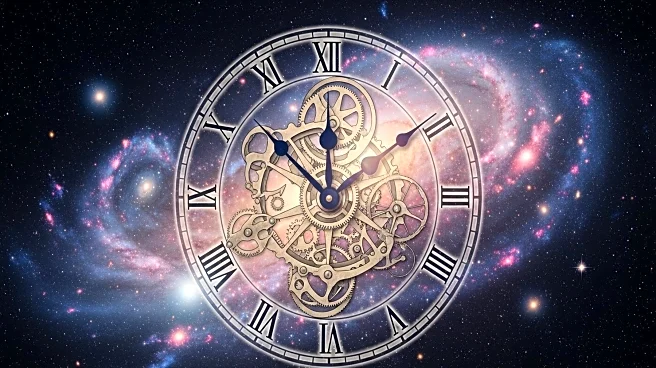What's Happening?
Physicists Hoang Nhan Luu, Yu-Cheng Qiu, and Henry Tye have proposed a model suggesting that the universe may eventually collapse under its own gravity due to evolving dark energy. This challenges the previously held belief that the universe would expand indefinitely. The study indicates that dark energy, a mysterious force driving the universe's expansion, could be evolving, resulting in a universe with a lifespan of approximately 33.3 billion years. With the universe currently being 13.8 billion years old, this suggests a little less than 20 billion years remain before a potential cosmic collapse. The cosmological constant, introduced by Albert Einstein, plays a central role in this discussion. A negative cosmological constant could reverse the universe's expansion, potentially leading to a Big Crunch.
Why It's Important?
The potential reversal of the universe's expansion has significant implications for cosmology and our understanding of the universe's fate. If the universe is indeed finite, it challenges long-held beliefs about its indefinite expansion and raises questions about the ultimate destiny of cosmic structures. This theory could reshape scientific perspectives on dark energy and the forces governing the universe. Understanding whether the universe has an end is as compelling as understanding its beginning, and this study provides a potential answer to one of cosmology's most significant questions.
What's Next?
Further research is needed to validate the potential evolution of dark energy and the role of axions in the universe's fate. The scientific community must continue to explore and analyze the dynamics of dark energy to gain a deeper understanding of its potential impact on the universe. As more data becomes available, alternative explanations could emerge, and researchers will strive to answer fundamental queries about the universe's origins and ultimate destiny.
Beyond the Headlines
The study's implications extend beyond theoretical interest, potentially reshaping our understanding of the universe's past, present, and future. As scientists delve deeper into these questions, they hope to gain more insights into the forces shaping the universe and its eventual fate. The possibility of a finite universe lifespan provides a potential answer to one of cosmology's most significant questions.









